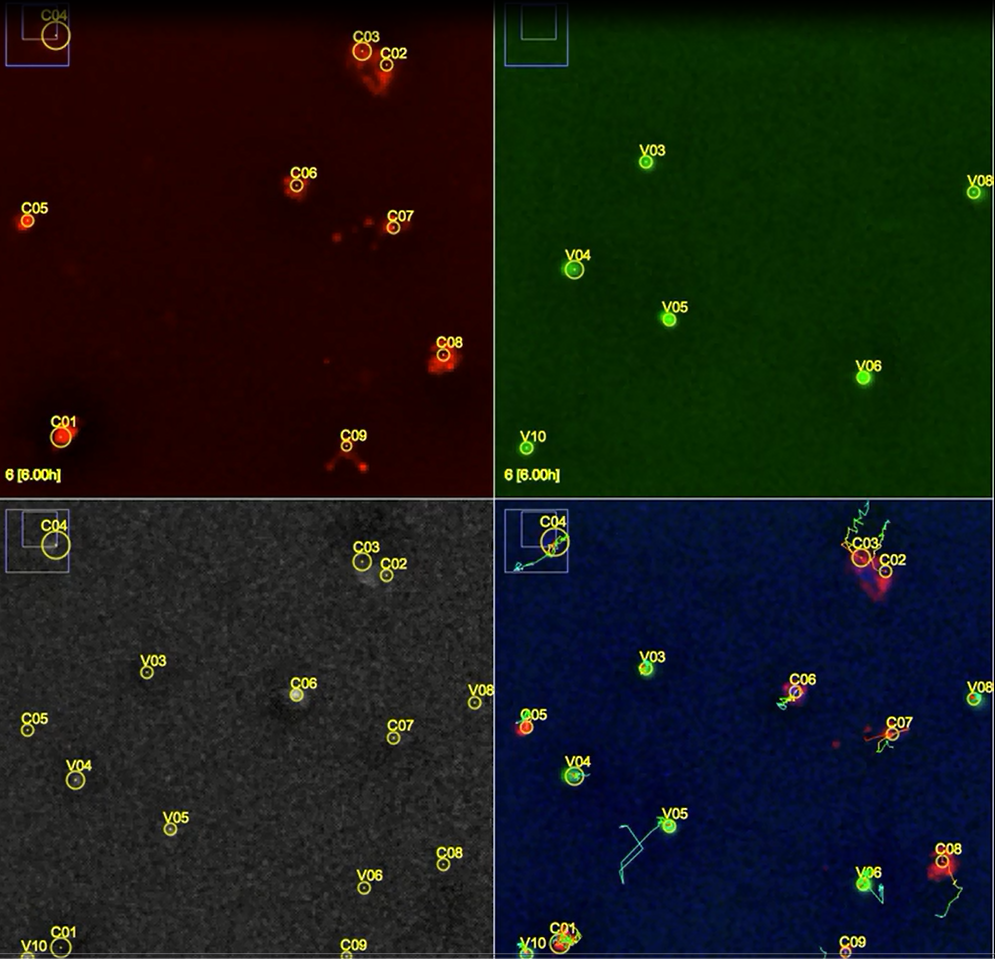Cellular jetlag seems to favor the development of diabetes

Individual pancreatic islet cells 6 hours following circadian synchronization in vitro. This technique allows to study the circadian oscillations in separated α- and β- islet cells in parallel.
©laboratoire Dibner – UNIGE.
Like almost all light-sensitive living beings, human beings follow biological rhythms set on a period of about 24 hours. The circadian clock (from Latin “circa” and “dies”, which means “about a day”) therefore describes the internal system that allows us to anticipate the changes of day and night by regulating nearly all the aspects of our physiology and behaviour. At a time when our biological rhythms are increasingly undermined - whether by night work, jetlag, or societal habits, - scientists begin to unveil the impact such circadian misalignments may have in the explosion of metabolic diseases. Specialists from the University of Geneva (UNIGE) and the University Hospitals of Geneva (HUG) studied pancreatic ɑ- and β- cells that are in charge of the production of insulin and glucagon, two hormones that regulate glucose levels in the blood. They discovered that already at cellular levels, these internal clocks orchestrate the timing of proper hormone secretion, thus optimizing body metabolism by anticipating the rest-activity and feeding-fasting cycles. Their misalignment would thus favor the occurrence of metabolic diseases. Their discovery, to be read in the journal Genes and Development, highlights an essential factor, yet still poorly understood, which may explain diabetes development as a consequence of circadian misalignments of these cellular clocks.
With type 2 diabetes affecting younger and younger people in the western world, researchers work on understanding how lifestyle changes in recent decades contribute to this ever-expanding epidemic, in the view of finding news strategies to curb it. Indeed, unlike our ancestors who lived according to the sun, nowadays, few Westerners still respect this millennial rhythm and recent studies have highlighted the connection between metabolic pathologies and the desynchronization of our internal clocks with the external world, a phenomenon dubbed “circadian misalignments”.
To each cell its clock
We do not have a single internal clock, but nearly as many as our bodies have cells. This allows our body to coordinate the metabolic processes that must not take place at the same time, such as sleep and wakefulness, therefore optimizing an energy balance between the fasting and feeding phases. Are these different cell clocks synchronous? “The role of circadian cycles in the orchestration of insulin secretion by the pancreatic islets has recently been demonstrated. However, we wanted to go a step further by refining the analysis. Because the pancreatic islet consists of different cell types, we have studied separately, in vivo and in vitro, the rhythms of insulin-producing α-cells, which lowers glucose levels in the blood, and glucagon-producing β-cells, which, conversely, increases glucose levels, as well as their interactions. This had never been done before,” indicates Dr. Charna Dibner of the UNIGE Faculty of Medicine and the HUG Department of Endocrinology and Diabetology. “Contrary to what we thought, these cellular clocks appear to be slightly distinct, which helps fine-tune the secretion of insulin and glucagon, and thus maintains glucose homeostasis. This fine coordination between α- and β- cellular clocks is actually the most optimized adaptation to the feeding-fasting state. Misalignments of these cell clocks may therefore lead to the disruption of hormone secretion and glucose homeostasis, and to the development of metabolic diseases such as obesity and diabetes.”
Without a clock, diabetes occurs quickly
Geneva scientists performed parallel high-throughput RNA sequencing of α- and β- cells at multiple time points within 24 hours, in order to unveil the temporal profiles of gene expression over a day. Dr. Volodymyr Petrenko, first author, explains the methodology: “We measured the expression of over 19,000 transcripts to identify exactly how the temporal regulation of the key functional genes in the endocrine pancreas occurs, thus generating a novel and important database available for the scientific community. It could indeed be very useful to researchers working on α- and β- cells to understand the influence of the time of day on gene expression, a factor that could, if not taken into account, distort their results.” Finally, the researchers compared this cell rhythm to that of mouse cells lacking internal clocks. In the latter, the perturbation of cellular oscillations directly led to alterations of the temporal profiles of glucagon and insulin secretion. “The mice whose pancreatic islets lack cellular clocks do develop type 2 diabetes, indicating that the disruption of cell rhythms is sufficient to perturb normal hormonal secretion and regulation of glucose homeostasis,” says Charna Dibner. “Thus, misalignment between the internal clocks and external changes of day and night may lead to a general metabolic imbalance and would explain why people working at night, for example, suffer more from metabolic disorders. Even if they sleep as much as the rest of us, catching up their sleep during the day disrupts all of their biological rhythms. ”
To validate their findings and consider future clinical applications, the scientists are now combining studies in rodent models and human pancreatic islet. “If indeed we can pinpoint that the circadian clocks are disrupted in the metabolic diseases in humans, similar to what was observed in rodents, we would like to develop approaches to resynchronize such failing clocks, in view of innovative therapeutic perspectives,” concludes Volodymyr Petrenko.
Contact: Charna Dibner, +41 22 379 59 34
20 Mar 2017